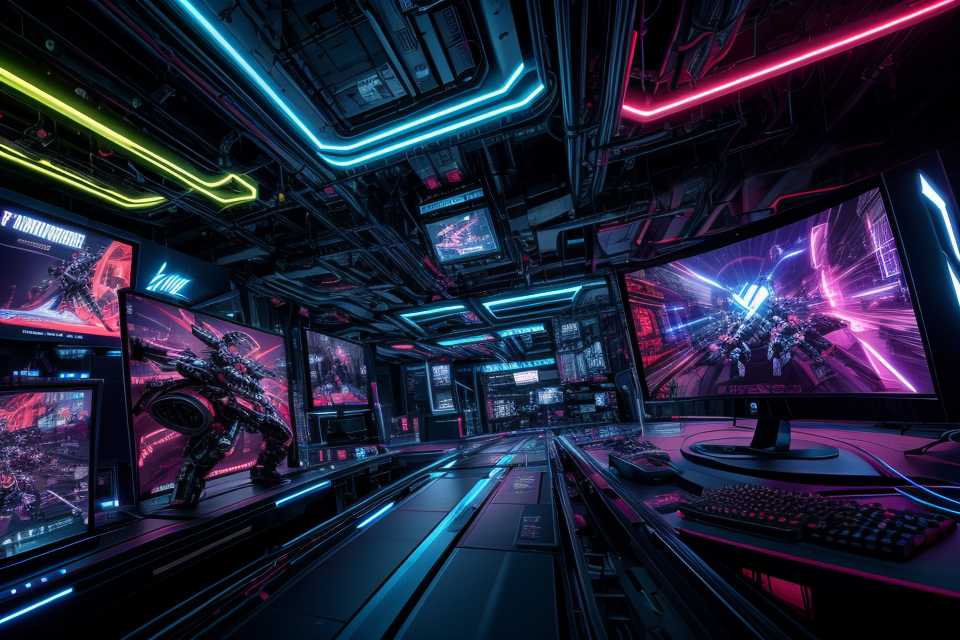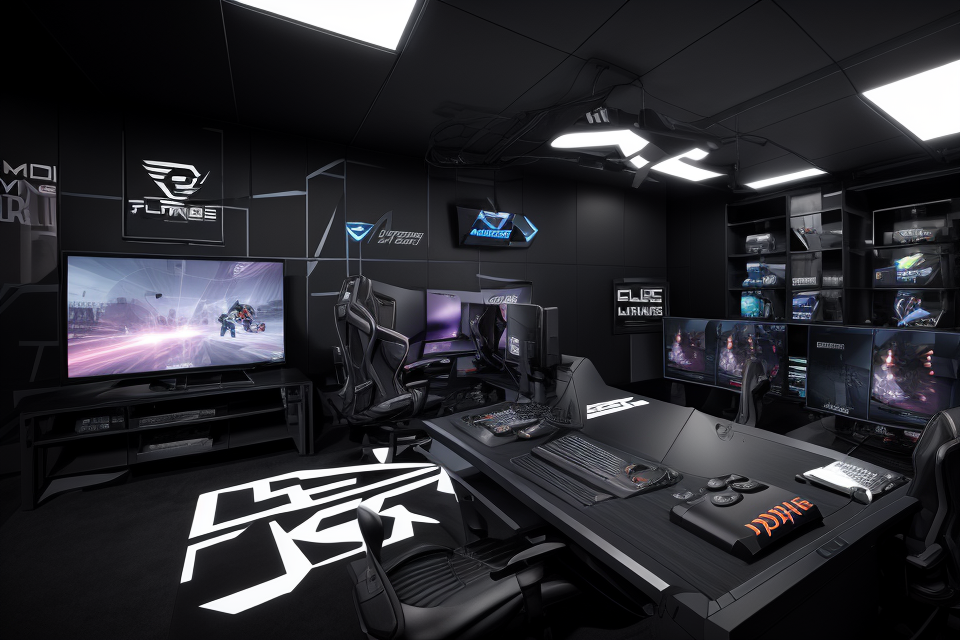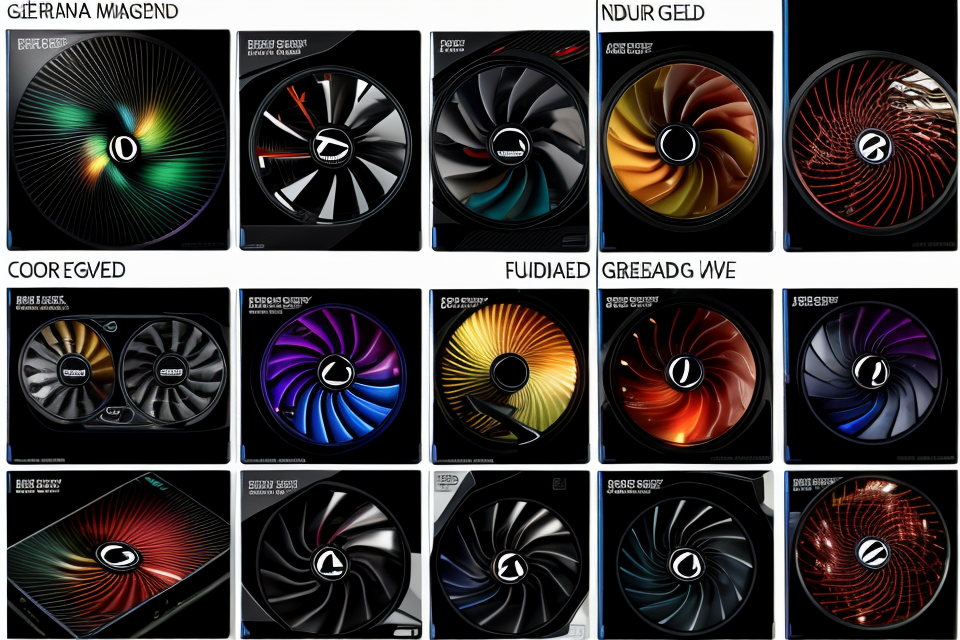
When it comes to gaming performance, there are two main components that come to mind: the CPU and GPU. Both of these components play a crucial role in determining the overall performance of a gaming computer. However, the question remains: which one is more important? In this article, we will explore the role of both the CPU and GPU in gaming performance and provide insights into which component is more critical for a seamless gaming experience.
The answer to which is more critical for gaming performance, CPU or GPU, depends on the specific game and hardware being used. In general, both the CPU and GPU play important roles in gaming performance, but the GPU is typically considered to be more critical as it is responsible for rendering images and processing graphics. However, if a game is particularly CPU-intensive, such as those that require complex calculations or physics simulations, then a higher-end CPU may be more critical for optimal performance. Ultimately, the performance of a gaming system will depend on a combination of both the CPU and GPU, as well as other factors such as memory and storage.
Understanding the Basics of CPU and GPU
The Role of CPU in Gaming
In the world of gaming, the central processing unit (CPU) plays a vital role in determining the overall performance of a game. The CPU is responsible for executing the majority of the instructions required for running a game, making it an essential component for providing a seamless gaming experience.
- Processing power and its impact on gaming performance: The CPU’s processing power directly affects the speed at which it can execute instructions, which in turn affects the overall performance of the game. A more powerful CPU can handle more complex tasks, resulting in smoother gameplay and reduced lag. On the other hand, a less powerful CPU may struggle to keep up with the demands of modern games, leading to sluggish performance and frustrating gameplay experiences.
- How CPU affects gameplay in various genres: The CPU’s impact on gameplay varies depending on the genre of the game. For example, in first-person shooters, the CPU’s performance can greatly affect the responsiveness of the game, making it crucial for maintaining a competitive edge in multiplayer matches. In strategy games, the CPU’s processing power can affect the speed at which the game can render complex maps and manage multiple units, which can have a significant impact on the player’s ability to make informed decisions. In general, a more powerful CPU can provide a smoother and more responsive gaming experience across a wide range of genres.
The Role of GPU in Gaming
- Rendering images and its importance in gaming
- How GPU affects frame rates and visual fidelity
Rendering Images and Its Importance in Gaming
The GPU, or graphics processing unit, is responsible for rendering images on a computer screen. In the context of gaming, this means that the GPU is responsible for creating the visuals that players see while they play. The GPU takes the information provided by the game’s engine and transforms it into an image that can be displayed on the screen.
Rendering images is a critical component of gaming performance because it directly affects the visual fidelity of the game. The better the GPU is at rendering images, the more detailed and realistic the game’s visuals will be. This is especially important in games that rely heavily on graphics, such as first-person shooters, racing games, and open-world adventure games.
In addition to affecting visual fidelity, the GPU also plays a role in determining the frame rate of the game. Frame rate refers to the number of frames that are rendered per second, and it directly affects the smoothness of the game’s animation. A higher frame rate generally results in smoother, more fluid animation, while a lower frame rate can result in a choppy, laggy experience.
Overall, the GPU is a critical component of a gaming computer, and it plays a key role in determining the performance of the game. Whether you’re playing a fast-paced first-person shooter or a slow, strategic RPG, the GPU is responsible for bringing the game’s visuals to life and ensuring that they look as good as possible.
Comparing CPU and GPU Performance in Gaming
Factors Affecting Gaming Performance
When it comes to gaming performance, both the CPU and GPU play a crucial role. However, several factors can affect the overall gaming experience. In this section, we will discuss the factors that impact gaming performance.
- Game engine complexity: The complexity of the game engine can significantly impact the performance of the game. Game engines are responsible for rendering graphics, animations, and physics simulations. Complex game engines require more processing power from both the CPU and GPU. Therefore, a more powerful CPU and GPU are needed to run the game smoothly.
- Screen resolution and refresh rate: The screen resolution and refresh rate also play a critical role in gaming performance. Higher screen resolutions require more processing power to render the graphics. Similarly, a higher refresh rate requires more processing power to render the images on the screen. Therefore, a more powerful CPU and GPU are needed to run the game at higher screen resolutions and refresh rates.
- Number of active objects on screen: The number of active objects on the screen can also impact gaming performance. For example, in a first-person shooter game, there may be multiple enemies on the screen, and each enemy requires processing power to render its graphics. Therefore, a more powerful CPU and GPU are needed to handle a large number of active objects on the screen.
In conclusion, the factors affecting gaming performance are game engine complexity, screen resolution and refresh rate, and the number of active objects on the screen. A powerful CPU and GPU are necessary to handle these factors and provide a smooth gaming experience.
CPU-Intensive vs. GPU-Intensive Games
- Examples of CPU-intensive games:
- Real-time strategy games (RTS) such as Starcraft, Civilization, and Age of Empires.
- Turn-based strategy games (TBS) like XCOM and Total War.
- Simulation games like the Euro Truck Simulator and Flight Simulator series.
- Examples of GPU-intensive games:
- First-person shooters (FPS) like Call of Duty, Battlefield, and Doom.
- Racing games like Assetto Corsa and Project Cars.
- Open-world games like Grand Theft Auto and Assassin’s Creed.
- The balance between CPU and GPU in different game genres:
- In CPU-intensive games, the CPU plays a more significant role in determining the game’s performance, as it handles tasks such as pathfinding, unit management, and terrain rendering.
- In GPU-intensive games, the GPU is responsible for rendering complex graphics, animations, and physics simulations, making it the more critical component for achieving high frame rates and smooth gameplay.
- The balance between CPU and GPU performance can vary depending on the specific game and its requirements. For instance, a strong CPU can help mitigate the effects of a weaker GPU, while a powerful GPU can offload some work from a weaker CPU. Ultimately, the optimal balance depends on the player’s preferences and the specific gaming setup.
The Impact of CPU and GPU on Multiplayer Games
Network Latency and Lag
In multiplayer games, the performance of both the CPU and GPU plays a crucial role in ensuring a smooth gaming experience. However, network latency and lag can have a significant impact on online multiplayer performance. In this section, we will explore how CPU and GPU affect online multiplayer performance and ways to reduce latency and minimize lag in multiplayer games.
How CPU and GPU affect online multiplayer performance
The performance of both the CPU and GPU is crucial in multiplayer games. The CPU is responsible for processing all the game’s data, including player actions, character movements, and other game mechanics. The GPU, on the other hand, is responsible for rendering the game’s graphics and visual effects. Both the CPU and GPU work together to ensure that the game runs smoothly and without any lag or stuttering.
In online multiplayer games, the performance of the CPU and GPU is even more critical. This is because the game needs to be transmitted over the internet to other players, which can introduce network latency and lag. If the CPU or GPU is underpowered, it can lead to delays in processing and rendering, resulting in a laggy and unresponsive gaming experience.
Reducing latency and minimizing lag in multiplayer games
To reduce latency and minimize lag in multiplayer games, there are several things that players can do. One of the most effective ways to reduce latency is to use a wired internet connection instead of a wireless one. Wired connections are generally more stable and have lower latency than wireless connections.
Another way to reduce latency is to use a dedicated gaming router. Gaming routers are designed to prioritize gaming traffic and reduce latency, ensuring that players have a smooth and lag-free gaming experience.
In addition to using a good internet connection, players can also optimize their PC’s hardware to reduce latency and minimize lag. This includes ensuring that their CPU and GPU are powerful enough to handle the game’s requirements and that their drivers are up to date.
Players can also try to reduce the number of applications running in the background, as this can affect the performance of the CPU and GPU. Closing unnecessary programs and background processes can help free up resources and improve the game’s performance.
In conclusion, network latency and lag can have a significant impact on online multiplayer performance in games. The CPU and GPU play a crucial role in ensuring that the game runs smoothly, and players can take several steps to reduce latency and minimize lag. By using a wired internet connection, a dedicated gaming router, optimizing hardware, and closing unnecessary background processes, players can enjoy a lag-free and responsive gaming experience.
Frame Rate and Matchmaking
The Importance of Frame Rate in Competitive Multiplayer Games
In competitive multiplayer games, a high frame rate is crucial for providing players with a smooth and seamless gaming experience. A higher frame rate ensures that players can react quickly to their opponents’ movements, which can be the difference between winning and losing a match. Therefore, frame rate is a critical factor in determining the overall performance of a gaming system.
How CPU and GPU Affect Matchmaking and Team Balancing
Matchmaking and team balancing are essential components of competitive multiplayer games. A well-designed matchmaking system ensures that players are matched with others of similar skill levels, while team balancing ensures that each team has a fair chance of winning. Both CPU and GPU play a significant role in determining the performance of a gaming system and, by extension, the matchmaking and team balancing experience.
A powerful CPU ensures that the game’s servers can process player data quickly and efficiently, allowing for smoother matchmaking and team balancing. A high-performance GPU, on the other hand, can render game graphics at higher resolutions and frame rates, providing players with a more immersive gaming experience.
In summary, both CPU and GPU are critical components in determining the performance of a gaming system. While a high frame rate is essential for a smooth gaming experience, matchmaking and team balancing require a balance between CPU and GPU performance. Therefore, gamers should consider both CPU and GPU when selecting components for their gaming systems.
Optimizing CPU and GPU Performance for Gaming
Tips for Optimizing CPU Performance
Overclocking is the process of increasing the clock speed of the CPU beyond its default specifications. This can improve gaming performance by allowing the CPU to complete more instructions per second. However, overclocking can also cause instability and damage to the CPU if not done properly, so it is important to use caution and follow safe overclocking practices.
Undervolting is the opposite of overclocking. It involves reducing the voltage supplied to the CPU, which can help lower its power consumption and generate less heat. This can improve gaming performance by allowing the CPU to run cooler and more efficiently. However, undervolting can also cause instability and damage to the CPU if not done properly, so it is important to use caution and follow safe undervolting practices.
Reducing unnecessary background processes can also improve gaming performance by freeing up system resources that would otherwise be used by these processes. This can be done by closing unnecessary applications and services, or by using tools to optimize the performance of the operating system. By reducing the load on the CPU and other system components, gaming performance can be improved and the overall gaming experience can be enhanced.
Tips for Optimizing GPU Performance
When it comes to optimizing your gaming performance, the GPU is a critical component that requires attention. Here are some tips to help you optimize your GPU performance:
- Updating drivers: One of the most important things you can do to optimize your GPU performance is to keep your drivers up to date. Graphics card manufacturers regularly release driver updates that improve performance, fix bugs, and add new features. Check the manufacturer’s website regularly to ensure you have the latest drivers installed.
- Adjusting graphics settings: The graphics settings in your game can have a significant impact on your GPU performance. You may need to adjust these settings to find the optimal balance between visual quality and performance. Lowering the resolution, reducing the number of shadows, and turning off anti-aliasing can all help improve performance.
- Overclocking (when safe): Overclocking is the process of increasing the clock speed of your GPU beyond its default settings. This can significantly improve performance, but it can also cause instability and damage to your GPU if done incorrectly. If you decide to overclock your GPU, do so cautiously and with a stable power supply and a good cooling system. Be sure to monitor the temperature and stability of your GPU while overclocking.
The Future of CPU and GPU Technology in Gaming
Evolution of CPU and GPU Technology
Moore’s Law and its impact on CPU and GPU performance
Moore’s Law is a prediction made by Gordon Moore, co-founder of Intel, that the number of transistors on a microchip will double approximately every two years, leading to a corresponding increase in computing power and decrease in cost. This has proven to be an accurate prediction for the past several decades, leading to a significant increase in the performance of both CPUs and GPUs. As a result, CPUs and GPUs have become increasingly important for gaming performance, with the latest generations of CPUs and GPUs offering significantly greater performance than their predecessors.
Advancements in GPU architecture
In addition to Moore’s Law, there have been significant advancements in GPU architecture that have contributed to the increasing importance of GPUs for gaming performance. One of the most notable advancements is the development of ray tracing technology, which allows for more realistic lighting and shadows in games. Additionally, AI acceleration has become increasingly important in gaming, as AI is used to generate more realistic NPCs and game environments. These advancements in GPU architecture have led to a significant increase in the demand for high-performance GPUs for gaming, making them a critical component for achieving optimal gaming performance.
The Impact of CPU and GPU Technology on Future Games
As technology continues to advance, the impact of CPU and GPU technology on future games will only continue to grow. Here are some of the ways in which CPU and GPU technology will shape the future of gaming:
- More immersive gameplay: With the rise of virtual reality and augmented reality technologies, CPU and GPU technology will play a critical role in creating more immersive gaming experiences. As games become more complex and require more processing power, CPU and GPU technology will need to evolve to keep up with these demands.
- The future of multiplayer gaming: Multiplayer gaming is becoming increasingly popular, and CPU and GPU technology will play a critical role in supporting these experiences. As more players join online games, the need for powerful CPU and GPU technology will only continue to grow.
- The rise of cloud gaming and its implications for CPU and GPU requirements: Cloud gaming is becoming an increasingly popular way to play games, and it has significant implications for CPU and GPU requirements. As more games are hosted in the cloud, the need for powerful CPU and GPU technology will only continue to grow.
Overall, the impact of CPU and GPU technology on future games will be significant, and it will be crucial for gamers to have access to powerful CPU and GPU technology to fully experience the future of gaming.
FAQs
1. What is the CPU and GPU?
The CPU (Central Processing Unit) and GPU (Graphics Processing Unit) are two critical components of a computer system. The CPU is responsible for executing general-purpose instructions, while the GPU is designed specifically for handling graphical tasks, such as rendering images and video.
2. Which one is more important for gaming performance?
For gaming performance, the GPU is generally considered to be more critical than the CPU. This is because modern games rely heavily on graphics processing, and a powerful GPU can significantly improve the visual quality and frame rate of a game. However, a fast CPU is still important for handling other tasks, such as game logic and physics calculations.
3. Can a game run without a GPU?
No, a game cannot run without a GPU. The GPU is responsible for rendering the images and video that are displayed on the screen, so without a GPU, the game would not be able to display any graphics. However, it is possible to run older games or simple games on a computer with a very slow or integrated GPU.
4. Can a game run without a CPU?
No, a game cannot run without a CPU. The CPU is responsible for executing the game’s code and handling various tasks, such as player input and physics calculations. Without a CPU, the game would not be able to run at all.
5. Can upgrading one component improve gaming performance more than the other?
In some cases, upgrading one component can improve gaming performance more than the other. For example, if a game is particularly CPU-intensive, upgrading the CPU may have a bigger impact on performance than upgrading the GPU. However, in most cases, upgrading both the CPU and GPU will provide the biggest improvement in gaming performance.
6. How do I know if my CPU or GPU is causing performance issues in a game?
To determine whether your CPU or GPU is causing performance issues in a game, you can use benchmarking tools such as 3DMark or Unigine Heaven. These tools can measure the performance of your CPU and GPU separately, allowing you to identify which component is causing the bottleneck. You can also try playing the game with a lower graphics setting to see if that improves performance, which may indicate that your GPU is the limiting factor.


